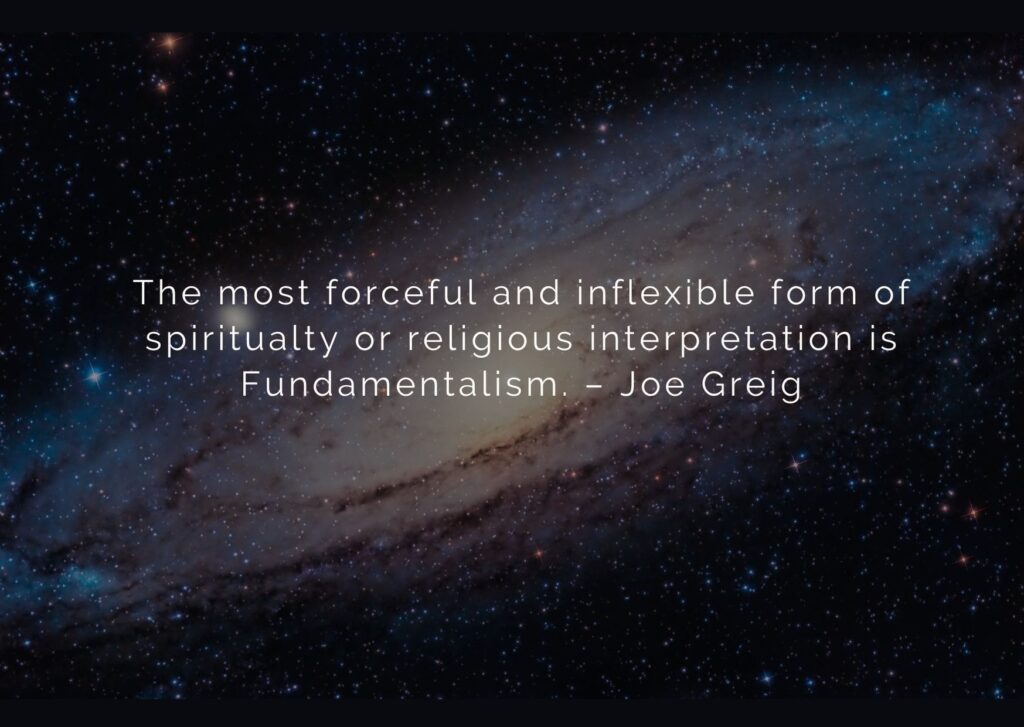Fundamentalism: A Hinderance to Spiritual Evolution
Webster defines Fundamentalism as a form of a religion, especially Islam or Protestant Christianity, that upholds belief in the strict, literal interpretation of scripture.
Growing Away From Fundamentalism
Like many Christian denominations the SDA Church fits this definition. It limits the notion of life and humanity to the pages of an ancient text. The reliance on such dogma is a hinderance to spiritual evolution. SDAs are spiritually bigger. But live a stunted life.
When religious institutions free themselves from strict dogma, society can move closer to accepting a series of undeniable facts. We can grow up. It’s simple really. We exist, the earth exists, the universe exists, and no one knows how or why. This is cosmic truth. If there is a god, how did that god come to be? If there was always a god, then there was always a universe.
Releasing the chains of dogma, especially fundamentalism as related to the literal words in the ancient, Bible texts, will free the mind. This freedom will allow acceptance of our tiny place in the cosmos. The splendor and fantastic state of it all. We are quite alone. Ours is the world, a speck in the ever-expanding universe.
The universe is greater and more phenomenal than notions of god. We are the cosmos, from it we became and we cannot escape from it. Even if there could have been a greater intelligence, a god, it too would have been tied, bound and made of and from the cosmos.
Inside the unknown is a basic truth. We are now. Humanity is a twinkle in the eye of time. That is a fundamental case for goodness.

Anonymous
Unknown Author
Submitted by A-A


July 15, 2021 @ 7:39 pm
What kind of person wrote this? Its just saying God does not exist. But God is the Engineer of the world. People that don’t accept God’s words will perish.
July 15, 2021 @ 9:12 pm
The initial question of what kind of person wrote this, is subject to the opinions of other persons with the competence to agree or disagree with the theoretically constructed information; or others who because of religious or ideological reasons believe the producers to be either atheistic subversives, scoundrels, sinners, or if the contrary, devout, moral, and kind persons. But this website is not necessarily about being competent in science or theology, but about understanding religion as an art form, thus religious expressions, artistically and metaphorically. Metaphors are neither true or false, but have evocative power. It is the intention of this website to concentrate on what metaphors evoke, not to prove them true or false. The resulting discourse may be considered religious discourse, but not necessarily theological, because it is more like being emergent from religious or artistic expression and encounter: an epiphany, flash of insight, conversion, or being Woke.
July 16, 2021 @ 6:31 am
I don’t see how talking about God as if he doesnt exist is about metaphors. How could God be a methpor if He is the creator of everything?
July 26, 2021 @ 2:14 am
How else can one talk about God except metaphorically? We use metaphors to address what we do not know. Look at the names given for God in the OT. Then consider that Jesus is called God’s Son. Now think of the doctrinal conflict generated by those who took it literally and deduced conclusions from that premise. The confession of the OT God as Creator is metaphorical as is John confession that the pre-existing logos was Jesus, eternal with God, and being God. Beyond this, the question about God’s existence is a philosophical problem which generated all the rational arguments to prove the existence of such a being, and ended up only with argument for the god of the philosophers..